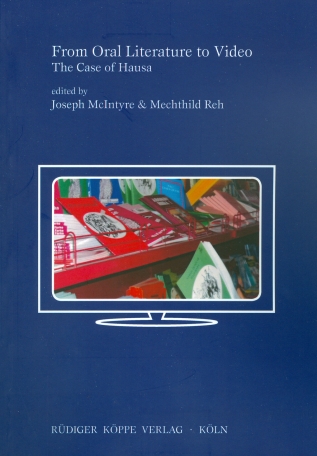
From Oral Literature to Video
The Case of Hausa
Translated by: Joseph A. McIntyre. Edited by: Joseph A. McIntyre, Mechthild Reh. With an introduction by: Joseph A. McIntyre, Mechthild Reh. With contributions by: Abdalla Uba Adamu, Ado Ahmad Gidan Dabino. Series edited by: Wilhelm J.G. Möhlig †, Bernd Heine.
Series: Study Books of African Languages Volume 21
201110 pp. Roman, 116 pp.
16 colour illustrations, 3 b/w illustrations
Text language(s): English, Hausa
Format: 150 x 210 mm
200 g
Paperback
€ 39.80
Buy 'From Oral Literature to Video' as a downloadable PDF document directly from our online shop »
Order 'From Oral Literature to Video' as print edition »
Hausa cultural genres have surely undergone many transformations over the course of the centuries. The themes, modes of performance, modes of production, the role of authorship as well as the available technology have all undergone change. It is perhaps the cosmopolitan background of Hausa, the most widely spoken African language in West Africa – not only in northern Nigeria and southern Niger but also in both larger and smaller communities from Sierra Leone to the Sudan –, which has facilitated the development of its traditional cultural forms hand-in-hand with imported technology.
The present work offers descriptions and analyses of recent changes in Hausa cultural genres affected by socio-political and technological developments. The question of survival and transformation of these genres is a key topic in this volume, explicitly discussed or at least implied throughout the work. Another major topic in the present work is the emergence of the new genre of love story (littattafan soyayya) in modern Hausa, in both written and visual media. These love stories originally appeared as novels towards the end of the 1980s, but could soon be found as videos and then DVDs. The first authors of this genre were women, and their male counterparts took up the baton and have continued to write on this theme.
Other genres discussed in this work include folk stories and children’s games, theatre and radio plays, novels, cinema, TV and videos and DVDs. This list is virtually a chronological inventory of these genres and corresponds closely to the direction in which development took place, a development heavily influenced by technology.
CONTENTS
Joseph McINTYRE / Mechthild REH:
Introduction
Ado Ahmad GIDAN DABINO (with transl. from Hausa into English by Joseph McIntyre):
Littattafan Soyayya: Samuwarsu da Bunkasarsu da kuma Tasirinsu ga Al’ummar Hausawa a Nijeriya (Hausa Love Stories: Origins, Development and their Impact on the Hausa in Nigeria)
Abdalla Uba ADAMU:
Media Technologies and Literary Transformations in Hausa Oral Literature
Abdalla Uba ADAMU:
Eastward Ho! Cultural Proximity and the Eastern Focus in Hausa Fiction and Video
The following Hausa textbooks and dictionaries have been published in our programme, see under Accompanying material.
Clicking on Cross-reference you will find further publications on African media cultures.
Following the link at the bottom, you will find the full review text (pdf file).
Accompanying material:
- Aspects of the Aesthetics of Hausa Verbal Art
(ISBN 978-3-89645-264-1 ) - Dictionary of Hausa Crafts / Kamus na Sana’o’in Hausa
(ISBN 978-3-927620-52-0 ) - Goethe-Gedichte – in die Hausa-Sprache übertragen
(ISBN 978-3-89645-410-2 ) - Hausa Comparative Dictionary
(ISBN 978-3-927620-53-7 ) - Hausa in the Sudan
(ISBN 978-3-89645-105-7 ) - Lehrbuch der Hausa-Sprache
(ISBN 978-3-89645-006-7 ) - Lehrbuch der Hausa-Sprache mit Audio-CD
(ISBN 978-3-89645-008-1 )
Cross-reference:
- African Languages in Global Society / Les langues africaines à l’heure de la mondialisation / Lugha za Kiafrika kwenye enzi ya utandawazi
(ISBN 978-3-89645-189-7 ) - African Linguistics in the 21st Century
(ISBN 978-3-89645-765-3 ) - African Media Cultures – Cultures de médias en Afrique
(ISBN 978-3-89645-246-7 ) - Bongo Media Worlds
(ISBN 978-3-89645-834-6 ) - Chadic and Hausa Linguistics
(ISBN 978-3-89645-043-2 ) - White Elephant
(ISBN 978-3-89645-837-7 )
Reviews
[...] the book is worth recommending to all interested in Hausa modern literature, films, music, and media, especially that it involves a “local insight” into the issues due to the fact that both contributors are at the same time the representatives of the Hausa culture.
Izabela Will in Studies of the Department of African Languages and Cultures, 46/2012, 132-138
PDF documents:
 | Review in “Studies of the Department of African Languages and Cultures” 46/2012, 132-138 | (≈ 4 MB) |
| « back | Print version | [top] |
 Books
Books Audio
Audio Biographies
Biographies Series
Series Festschrifts
Festschrifts Journals
Journals